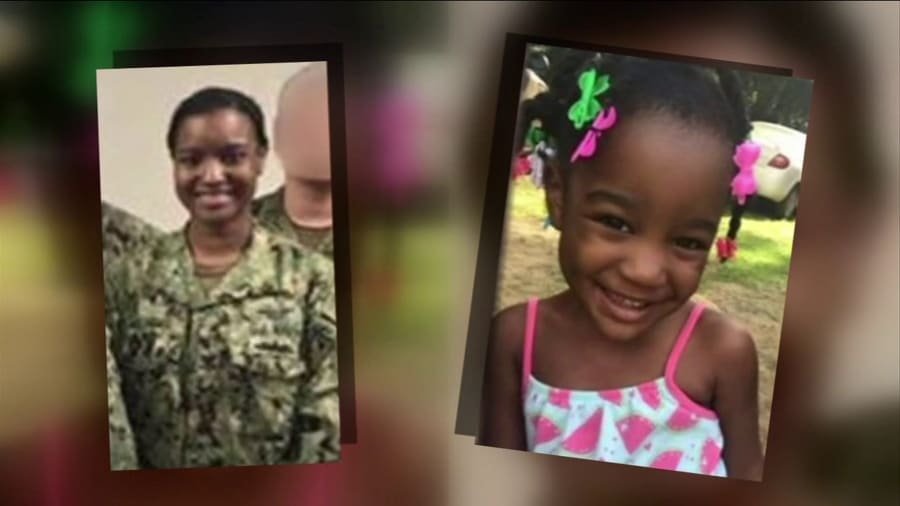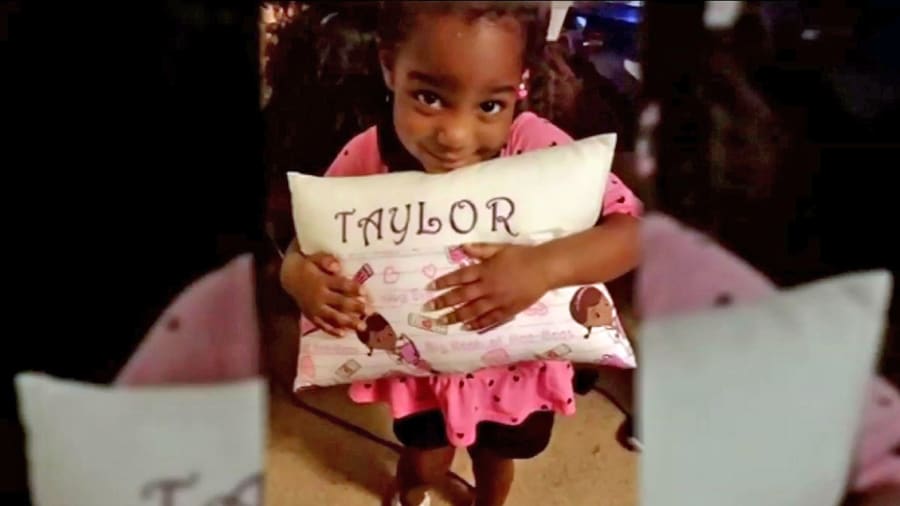JACKSONVILLE, Fla. – During Brianna Williams’ sentencing hearing Friday, someone read a statement on behalf of the Jacksonville mother who pleaded guilty to second-degree murder in the death of her 5-year-old daughter.
In the statement, Williams said: “I accept full responsibility for everything. ... I blame no one but myself.”
Williams, 30, faces from 20 years to life in prison in the death of her daughter, Taylor.
Judge Kevin Blazs said he’ll be taking everything he heard during Williams’ two-day sentencing hearing into consideration and reviewing the 127 exhibits and other expert records he couldn’t get to. He also said he will hand down his sentence for her on Tuesday.
On Nov. 6, 2019, Williams called 911 saying she had awakened to find her back door open and her daughter missing. But that was a lie.
Among those testifying Friday was a psychologist, who said that Williams described to him the day she found her daughter dead in their apartment -- more than a month earlier.

The psychologist said somewhere at the end of September or October of 2019, Williams went to bed early and let Taylor stay up. She told him that around noon the next day, she went looking for Taylor and found the little girl in a closet, slumped over and cold. He said Williams told him she didn’t know what to do and considered suicide multiple times.
During cross-examination by prosecutors, the psychologist said Williams left her dead daughter in the apartment and didn’t return for weeks, possibly a month.
Earlier, he testified that Williams told him she put Taylor in a container and drove to her grandfather’s grave, but she couldn’t find the grave and became distraught, so she left the body. He said she told him that when she went back, she couldn’t find it.
Later, she called police to report her daughter missing and following the alert, a large-scale search was launched that a detective testified Friday included more than 100 units.
The detective said about a dozen members of the homicide unit and 75 officers from the Jacksonville Sheriff’s Office eventually traveled to Alabama, after tracking Williams’ movements. Once in Alabama, they found children’s remains buried in a wooded area of rural Marengo County. Prosecutors pointed out that only 10% of Taylor’s remains were found because her mother “left her decaying body on the side of the road.”
When it came time to read her prepared statement, Williams asked that someone else do it for her because she was “scared and nervous.” A mitigation specialist with the public defender’s office read the statement on Williams’ behalf:
“I know what I did was wrong. I failed as a mother, a protector and as a decent human being. I didn’t immediately call the police and when I finally called, I lied and lied some more. I didn’t take advantage of any timely opportunity to right my wrongs.
I apologize to everyone affected by this tragedy. I’m tormented and punished every day since losing my baby. I tried to kill myself to escape it all, however, I’m not asking for any sympathy. I deserve everything I’ve received over the past approximately three years, externally and internally. I lost the most important person in my life and without her, I lost myself.
I accept full responsibility for everything. I voluntarily plead up to murder. I blame no one but myself.”
Prosecutors then wrapped up their case for the judge, arguing that Williams should be sentenced to the maximum of life in prison.
The prosecutor said Williams had many chances to tell the truth when she contacted police on Nov. 6, 2019, to report her daughter missing -- and many chances after that.
“Five days, three states, hundreds of officers, miles of lands searched day in and day out -- all coming to a close because Captain Roberts followed his nose in the pitch black on his hands and knees scouring every piece of dirt,” she said. “Not knowing at the time just eight days prior, this defendant discarded her daughter like a piece of trash on the side of the road. Her tiny body in a t-shirt wrapped in a filthy shower curtain like nothing more than trash.”
The prosecutor said because of the state Taylor’s body was in when Williams finally left it, “we’ll never know exactly how she died.”
Neighbors, authorities testify
During testimony Thursday, the court heard for the first time from a neighbor who saw Taylor left at home alone. That neighbor’s statements are what ultimately led to Williams being arrested for child neglect.
Carlos Johnson said he knew Brianna Williams only casually. He testified that on the morning of April 17, he saw Taylor outside alone.
Johnson went on to say he saw Williams arrive home that night, but he didn’t speak to her and answered “no” when Williams’ defense attorney asked him if he ever called the police.
Johnson also said he never saw Taylor after May 15, and when he asked Williams about her daughter, she told him she was with her grandparents in Alabama.
The defense asked Johnson if he was sure about the day he saw Taylor outside alone and then pointed out he didn’t know Williams that well.
RELATED: Neighbors, authorities testify ahead of sentencing for mother guilty of killing 5-year-old daughter
Another neighbor testified that she offered to help with babysitting after learning Taylor was left alone, but Williams never took her up on the offer.
The 911 call Williams made on Nov. 6, 2019, was played in court on Thursday, and the jury also heard testimonies from the responding officer and the detective from the missing persons unit.
Jay Livingston, the responding officer with the Jacksonville Sheriff’s Office, said there was no one waiting on him outside when he arrived at the home on Ivy Street, which is unusual when responding to a missing child case. Livingston said he spent time canvassing the street to find the house, but realized he was given the wrong address.
It wasn’t until six minutes later that Williams came out and could be seen on the body camera footage. The defense argued that Williams could have been in the backyard where the officer couldn’t see her yet.
Livingston said Williams, who was in full military uniform, was crying when he first saw her, but she didn’t seem emotional.

He said he “thought her tears were forced,” and that she “didn’t appear overly emotional.”
When Livingston went into Williams’ room, he said he saw multiple guns on the bed but didn’t see children’s toys or anything other than a small bed that looked like a child had been living there.
Williams said she heard noises and walked around with her gun but didn’t go into her daughter’s room.
Lashantae Whitaker, a detective with the Jacksonville Sheriff’s Office Missing Persons Unit, also testified about her interview with Williams after the investigation turned criminal.
“During the interview, she didn’t remember crying. [I] had to ask her to put her phone down. She was texting and answering phone calls. Parents are usually upset, wanting to know what’s next. She didn’t ask what they were doing to find Taylor,” Whitaker said.
In the interview video played at the sentencing trial, Williams could be heard getting overwhelmed during questioning saying, “I am over this” and responding “not right now” when Whitaker asked if she wanted to answer any more questions.
The state showed pictures from crime scene unit investigators who said they smelled feces inside the home. The defense said there was no testing done to verify if it was actually feces the officers were smelling. The same defense was used for the pictures of soiled children’s clothes and underwear.
A chief who worked with Williams in the Navy testified as well. He said he picked up Williams after she was interviewed by the police and she didn’t cry or say she wanted to look for Taylor.
The defense countered that the relationships with these witnesses were mainly at work.
The state also called a forensic investigator who looked into Williams’ search history on her computer. There were several articles about violence against children and malnourishment.
The defense argued that there was no way of knowing if a person typed in those articles or if they popped up on their own.




